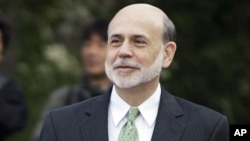The head of the U.S. central bank argued for more efforts to stimulate the economy on Friday, but did not say when or how such action might be taken.
U.S. Federal Reserve Chairman Ben Bernanke said unemployment is a "grave concern" and economic growth is too slow.
Recent comments from Federal Reserve officials show that more members are convinced that it may be time for further action.
That might happen at the next scheduled meeting of the Fed in mid-September.
Bernanke told an audience of economic experts at a resort in Wyoming that very low interest rates and a program of buying large quantities of bonds have helped boost economic growth.
The bond-buying effort is called "quantitative easing," and is intended to cut long-term interest rates and encourage investment.
One Washington economist, Margo Thorning, said Bernanke and his colleagues may eventually try that tactic again.
"I think he is waiting to see what happens to the underemployment numbers in the next couple of months," said Thorning. "But another round of quantitative easing is certainly being discussed."
Thorning is the chief economist for the American Council for Capital Formation, which advocates tax, energy, regulatory and environmental policies that facilitate saving and investment.
She said uncertainty about future tax rates and business regulation are hurting the economy by making businesses less likely to take risks and make the investments in factories and facilities that lead to new jobs.
U.S. Federal Reserve Chairman Ben Bernanke said unemployment is a "grave concern" and economic growth is too slow.
Recent comments from Federal Reserve officials show that more members are convinced that it may be time for further action.
That might happen at the next scheduled meeting of the Fed in mid-September.
Bernanke told an audience of economic experts at a resort in Wyoming that very low interest rates and a program of buying large quantities of bonds have helped boost economic growth.
The bond-buying effort is called "quantitative easing," and is intended to cut long-term interest rates and encourage investment.
One Washington economist, Margo Thorning, said Bernanke and his colleagues may eventually try that tactic again.
"I think he is waiting to see what happens to the underemployment numbers in the next couple of months," said Thorning. "But another round of quantitative easing is certainly being discussed."
Thorning is the chief economist for the American Council for Capital Formation, which advocates tax, energy, regulatory and environmental policies that facilitate saving and investment.
She said uncertainty about future tax rates and business regulation are hurting the economy by making businesses less likely to take risks and make the investments in factories and facilities that lead to new jobs.








